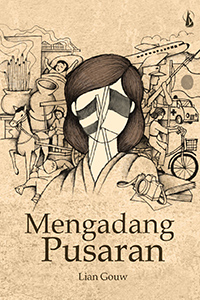Reviews
Melani Budianta, Professor of Literary Studies, University of Indonesia:
This novel draws the reader into the maelstrom of world politics—before and after World War II—and its turbulent currents that also reached Indonesia.
Widjati Hartiningtyas’s sensory literary translation vividly embodies the daily lives of three generations of a Chinese family in Bandung during that troubled, transitionary time. The intricate plot describes the ways colonial ideology and power were internalized by society, thus segregating and alienating one social group from another, as people positioned themselves differently vis-a-vis the Dutch and Indonesian independence fighters. This novel depicts the heterogeneity of the Chinese community in Indonesia—their language, religion, and cultural orientation—even within one single family.
Lian Gouw’s Mengadang Pusaran is a literary work that is finely crafted, shows in-depth historical and sociological research, and maintains a sensitivity towards the psychology of the characters as they deal with love and politics in a time of crisis.
==================
Yumi Kitamura, Associate Professor, Kyoto University:
Mengadang Pusaran narrates the lives of three Chinese women living in Indonesia between 1932 and 1950. Their stories reveal different perspectives of women from various generations within a family that was culturally oriented towards the Dutch during the Japanese occupation and the Indonesian revolutionary struggle.
As a researcher of Chinese Indonesians, I often experienced difficulties in getting women’s life histories during field interviews. Many women dismissed their experience as being unimportant, or they were not sure that they could express themselves appropriately. Reading this novel enables me to understand untold feelings of my research subjects.
I remember the joy I felt as I read the original novel in English, Only A Girl. I am impressed with the eloquent Indonesian translation that allows the reader to experience the sounds, smells, and atmosphere of Bandung in the mid-1900s.
Mengadang Pusaran is a story about us and our families in a different time and place.
==================
Asri Saraswati, Lecturer in the English Department, University of Indonesia:
Mengadang Pusaran tells the story of a Chinese family faced with the end of Dutch colonialism and the beginning of the Indonesian revolution for independence. The novel recounts the struggles of three women, from three different generations, against the pressure of traditional values and colonialism.
Carolien, who was raised with Dutch values and culture, pursues her own happiness after her family forbids her to marry the man she loves. Jenny, her daughter, grows up during the turmoil of the Japanese occupation and the early years of Indonesia’s independence. Amid the geopolitical upheaval beyond their control, both strive for their independence by determining the course of their own lives.
As Chinese women, they are oppressed through their ethnicity and gender. The traditional family figure is depicted by Nanna, the grandmother, who tries hard to keep the family together. The story of the Chinese community in Indonesia, which is neither simple nor singular, is narrated carefully, as Chinese families from various backgrounds intersect with one another.
Originally written in English by Lian Gouw, an Indonesian emigre living in the United States, Only A Girl has now come home as Mengadang Pusaran — a translation by Widjati Hartiningtyas in the Indonesian language. The story flows beautifully and feels intimate, as if it were, from the beginning, written in Indonesian. The novel can be construed as a political statement and a story of the struggle between Western values and local ones—but above all, it is a story that reveals how a woman’s wisdom can transcend the constraints of time.
==================





